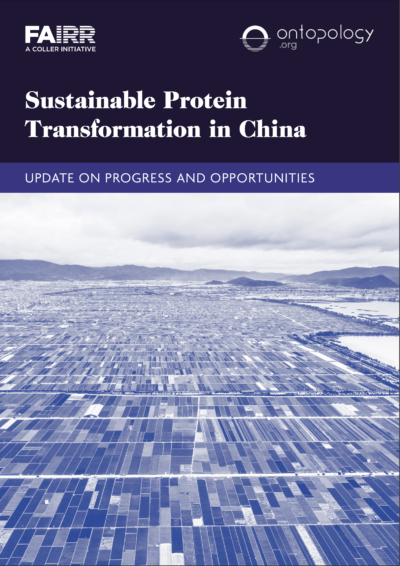Executive Summary
This progress report, co-authored by the FAIRR Initiative and Ontopology Initiative, provides an update on last year’s report: Transforming Animal Agriculture in China.
In a world defined by climate change and biodiversity loss, declining food security, and malnutrition, it is undeniable that the global food system has reached an inflection point. As such, the need to transform the way we produce and consume food has become increasingly urgent, and the largest global meat, dairy and aquaculture companies play a key role in this transformation.
The Coller FAIRR Protein Producer Index assesses the 60 largest publicly listed animal protein companies on ten key Environmental, Social and Governance (ESG) risks and opportunities each year. Chinese companies are well-represented, with 12 out of the 60 companies covered by the index being based in the People’s Republic of China (hereafter “China”). These companies also represent 43% of market capitalisation in the Index – a significant portion of the global industry, meaning that they are crucial in shifting the industry towards more sustainable practices. Several developments in agri-food and finance policy within China, such as the inclusion of alternative proteins in the 5-year agricultural plan, are strong signals of change. These present opportunities both for food security and sustainability domestically, and for international trade and exports.
An analysis of Chinese companies’ performance on selected ESG risks in the Index is presented alongside an overview of the current policy environment surrounding sustainable food systems and finance, informing key stakeholders about recent developments, risks and opportunities in China’s agri-food system. Many of the Chinese government’s prioritised policy areas, which include Carbon Neutrality, Ecological Civilisation, Rural Revitalisation, and Healthy China 2030[1] are closely linked to ESG issues in animal agriculture and the broader transformation of the food system. The overall shift in policy priorities towards environmental and social themes is in turn reflected by the Index, with promising year-on-year growth witnessed among some companies’ scores and reporting on key ESG issues. This information may be of particular interest to investors who are tracking these trends.
Recent proliferation of sustainable finance and corporate reporting regulation also indicates that disclosure of ESG risks and impacts are rising up the Chinese policy agenda. Developments include more detailed ESG reporting guidelines, followed by a mandatory disclosure reporting framework intended to be in place by 2025. The report also finds that a number of the largest China-based animal protein companies are diversifying into plant-based alternatives, and that firms with alternative protein business could consider raising finance through green bonds, the market for which has grown significantly in China over the past three years.
Report Highlights
Mandatory disclosure of ESG risks and impacts are rising up the Chinese policy agenda as China’s Nationally Determined Contributions (NDCs) recognise agriculture as a key sector for emissions reduction, and a sector in which to build climate resilience.
Many of the Chinese government’s prioritised policy areas, including Carbon Neutrality, Ecological Civilisation, Rural Revitalisation, and Healthy China 2030, are closely linked to ESG issues in animal agriculture and broader food system transformation.
The mention of synthetic proteins in multiple government plans are important milestones for the industry, and market trends demonstrate that the market share for alternative proteins is growing in China and likely to expand further.
The 12 Chinese companies included in the Coller FAIRR Protein Producer Index represent 43% of the market capitalisation covered and are some of the largest protein producing companies headquartered in China to have launched plant-based products and brands.
An analysis of Chinese companies’ performance on selected ESG risks in the Index presents an overview of the current policy environment surrounding sustainable food systems and finance, informing key stakeholders about recent developments, risks and opportunities in China’s agri-food system.

